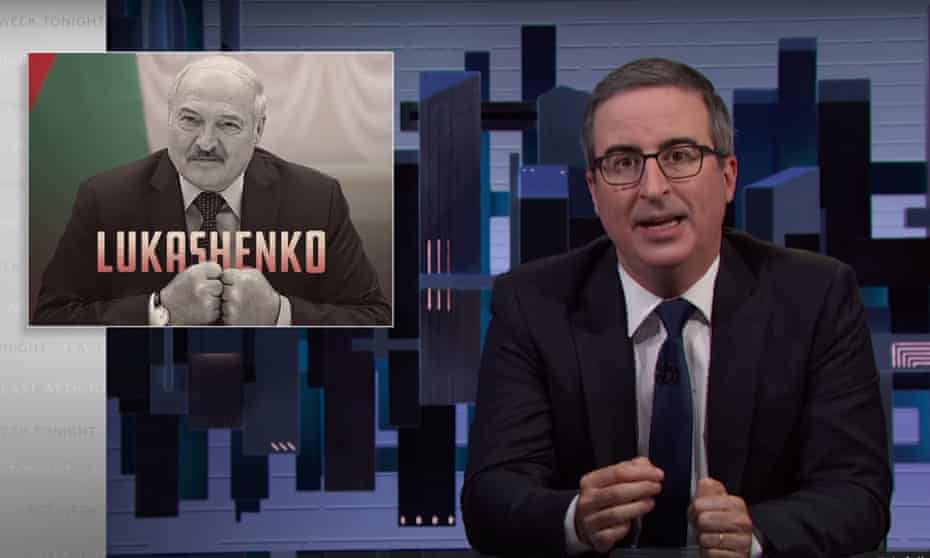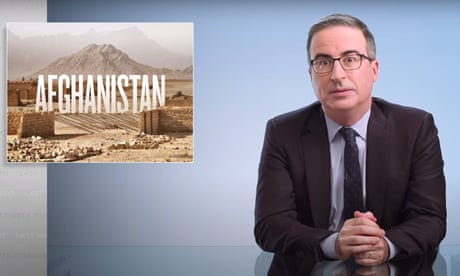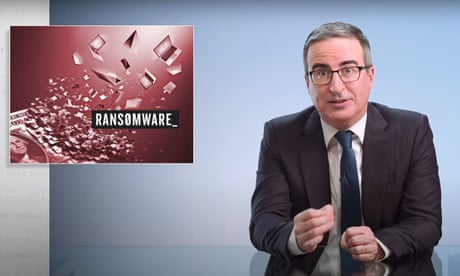John Oliver returned to the Last Week Tonight studio for the first time since spring 2020 on Sunday night, with a segment about Alexander Lukashenko, the unpopular autocratic leader of Belarus facing increasing unrest.
Despite widespread national protests against his nearly 30-year rule over the past year, state-approved exit polls said Lukashenko won a 2020 election with an 80% majority. “Which was immediately fishy for a couple of reasons,” said Oliver. “One, the massive protests that followed, and two, the idea that any man could still be popular after nearly three decades in the public eye.”
Lukashenko: Last Week Tonight with John Oliver (HBO)The recent protests were sparked in part by discontent with Lukashenko’s handling of the pandemic, which “from the beginning, was incredibly reckless”, said Oliver. This is the European leader who once called the virus a “psychosis” treatable with vodka and saunas, and then denied its existence at a crowded hockey game since he couldn’t see the virus “flying around”.
Lukashenko is also the self-described “last and only dictator in Europe,” which is “just an amazing thing to say”, said Oliver, since “bragging about being the ‘last dictator’, is like bragging about being the last RadioShack or the last person to make a movie with Harvey Weinstein – it’s not an enviable title.”
For a generation of young Belarusians involved in the protests, Lukashenko is the only leader they’ve ever known. The 67-year-old former produce farmer won Belarus’s first free and fair election in 1994, three years after the fall of the Soviet Union, on the promise of raising taxes on the rich and fighting corruption. “It sounded great, and he was genuinely popular at the time,” Oliver explained, “but for all Lukashenko’s common man posturing” – he once gifted the Russian president, Vladimir Putin, two sacks of potatoes and a tub of lard – “his promises to combat corruption quickly fell apart”.
Just five months into his presidency, Lukashenko banned press coverage of a government report on corruption which named high-ranking officials; local newspapers instead printed blank pages in place of their stories. Lukashenko later replaced the editors-in-chief of four leading newspapers and put national TV and radio under state control, “creating an environment so hostile to independent journalism, Belarus is now considered the most dangerous country in Europe for members of the media”, Oliver said, with journalists routinely subjected to violence, arbitrary detentions, interrogations, raids and more.
Lukashenko’s pettiness reportedly extends to even banning members of the press from filming the back of his head, owing to his bald patch. More seriously, he has repeatedly denigrated LGBTQ people, praised or at least played “devil’s advocate” for Hitler, and treated antisemitism “the way fashion treats low-rise bellbottoms – he keeps bringing it back, even when it was never acceptable at any point in history,” said Oliver.
Lukashenko has operated “from the standard authoritarian playbook” to consolidate and codify his power, Oliver added. Through controversial referendums, he extended his first term, concentrated power away from the legislature, and eventually removed term limits altogether in 2004. Outside observer groups have reported that none of his last five electoral victories have been legitimate.
“For nearly three decades now, Belarus has experienced a brutal cycle of oppression in which Lukashenko wins elections that are neither free nor fair, locks up his political opponents, people take to the streets in protest, and he violently cracks down,” Oliver summarized. “It is no wonder the Belarusian people seem to have had enough.” A recent leaked poll showed that only about a third of Belarusians trust Lukashenko, “which is impressively low considering, remember, he controls the national media”.
The US, UK, EU and Canada have imposed sanctions on Belarus, but “the truth is, sanctions can only do so much here”, Oliver said, “and Lukashenko does not seem keen to end his reign”.
“At this point, it looks like the only thing that will really improve things in Belarus is if the people there somehow manage to reform their constitution and ensure that free and fair elections are finally held,” the host concluded. Given Lukashenko’s recent crackdowns on human rights activists and journalists and purges of political opponents, “fighting for those changes is going to be incredibly risky. But there may be one extremely small way that we can actually help here.” Or, at least, “annoy the shit out of Lukashenko” with one of his least favorite protest methods: stuffed teddy bears with pro-democracy messaging.
“If there’s one thing we know he hates, other than gay people, Jews, his own bald head, and anyone who disagrees with him, it is teddy bears,” Oliver explained, as the bears are “everything that he’s not: cute, lovable, and covered in thick, natural hair all the way around.”
Oliver directed viewers to Last Week Tonight’s Belarus Bear Force website, where you can purchase small teddy bears with T-shirts of “Farmer Lukashenko’s” vegetables arranged in an, ahem, phallic configuration, with all proceeds going to organizations fighting for freedom of the press and human rights in Belarus.


